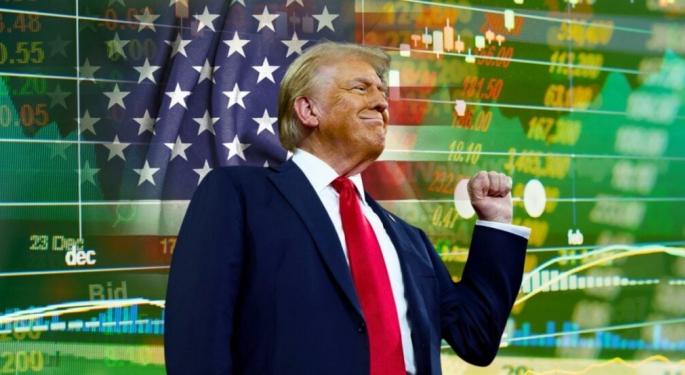Trump's Economy Is Riding A Tsunami Of Inflows — So Much For 'Sell America'
Despite fears that President Donald Trump‘s aggressive tariff policy would crush the appeal of U.S. assets, foreign investors are doing the exact opposite—buying American securities at a record-setting pace and powering one of the strongest rallies in recent history.
According to May’s Treasury International Capital System (TICS) data, total net capital inflows into the U.S. reached an unprecedented $1.76 trillion over the 12 months ending in May 2025.
That includes everything from Treasuries and corporate bonds to stocks and Treasury bills.
These numbers flatly defy the doomsday narrative of an "end to U.S. exceptionalism" that followed Trump's April 2 tariffs, which had briefly sent stocks, bonds and the dollar tumbling in unison.
‘US Exceptionalism' Was Supposed To End With Trump — Instead, It's Breaking New Records
In a note shared Monday, veteran Wall Street strategist Ed Yardeni said that despite the noise, investors abroad are not fleeing U.S. markets.
"Doomsters warn that foreign investors are losing their confidence in U.S. Treasuries and in the U.S. dollar," he said.
"Yet, the Treasury’s latest TICS data show that they remain strong buyers of U.S. debt."
Foreign investors poured $597 billion into U.S. equities over the past year—setting a record pace that aligns closely with the dramatic rebound in U.S. stock markets.
Since the correction low on April 8, the S&P 500 – as tracked by the Vanguard S&P 500 ETF (NYSE:VOO) – has surged 26.4% breaking new all-time highs.
During May alone, $114 billion flowed into U.S. stocks, while another $146 billion was allocated to Treasuries and bonds.
Foreign Investors Drive Wall Street Boom
A key insight from the data is that private foreign investors, rather than official government institutions, are leading the charge.
Of the $1.76 trillion in inflows, just $33.5 billion came from official foreign accounts, while an overwhelming $1.73 trillion was attributed to private investors—pension funds, asset managers and institutions with a long-term mandate for returns and stability.
The U.S. bond market also witnessed robust international buying. Foreign purchases of U.S. bonds totaled $941 billion in the past year, including $541 billion into Treasuries, $267 billion into corporate bonds and $133 billion into agency paper.
In the short-term market, inflows into Treasury bills hit $336 billion over the same period, with private investors accounting for $193 billion of that total.
This surge in demand helps explain why long-term bond yields have remained surprisingly stable despite fiscal pressures and rate volatility. The 10-year Treasury yield has hovered between 4.25% and 4.75% for much of the year, a range that Yardeni said reflects a normalization in bond pricing last seen before the Great Financial Crisis.
Why Is The Dollar Still Weak?
One piece of the puzzle remains confusing.
Despite the massive foreign capital inflows, the U.S. dollar index (DXY) has plunged by 10% in 2025. Yardeni called the dollar's drop a "correction," not a new long-term trend.
He said the divergence between flows and dollar performance may reverse soon, especially as bond and equity demand remains solid and U.S. growth stays ahead of global peers.
Faith In US Market Dominance Holds Firm
The strength of U.S. inflows suggests that global investors see Trump's trade war not as a deal-breaker, but a temporary hurdle.
"Our faith in the kindness of strangers has been validated by the latest Treasury data," Yardeni said.
The latest data leaves little doubt: despite trade tensions, fiscal ballooning and a shifting global landscape, U.S. markets remain the preferred destination for global capital.
And as long as American assets continue to deliver returns—and relative economic outperformance—foreign investors are not just staying in the game, they're doubling down.
For now, the "Sell America" narrative has been buried under $1.76 trillion worth of foreign conviction.
Read Next:
Image created using photos from Shutterstock.
© 2025 Benzinga.com. Benzinga does not provide investment advice. All rights reserved.
Posted-In: Analyst Color Equities Macro Economic Events Bonds Broad U.S. Equity ETFs Treasuries Global Econ #s



